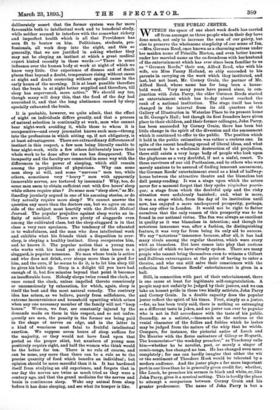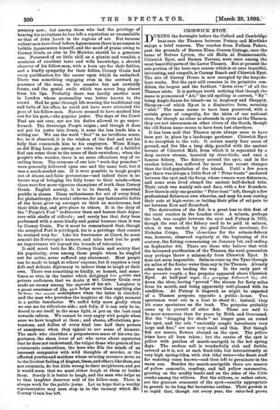THE PUBLIC JESTER.
WITHIN the space of one short week death has carried off from amongst as three people who in their day have done much, not only to increase the sum of our gaiety, but also to preserve the wholesome simplicity of our sense of fan, —Mrs. German Reed, once known as a charming actress under her maiden name of Priscilla Horton, and even better known under her married name as the co-foundress with herhusband of the entertainment which has ever since been familiar to us as "German Reeds," their son, Alfred Reed, who with his wife, née Miss Fanny Holland, so ably succeeded to his parents in carrying on the work which they instituted, and last, but not least, Mr. Corney Grain, the partner of Mr. Alfred Reed, whose name has for long been a house- hold word. Very many years have passed since, in con- junction with John Parry, the elder German Reeds started an entertainment which has to-day almost reached the rank of a national institution. The stage itself has been changed in the interval from its old quarters at the Gallery of Illustration in Waterloo Place to its present home in St. George's Hall ; but though its first founders have given place to their children, and their former colleague, John Parry, has been succeeded by Corney Grain, there has been but little change in the spirit of the diversion and the amusement which it continued to offer to the public. The position which it held in the public estimation was rather a curious one. In spite of the recent headlong spread of liberal ideas, and what has seemed to be a wholesale destruction of old prejudices, there still exists a very large body of people who look upon the playhouse as a very doubtful, if not a sinful, resort. To these survivors of our old Puritanism, and to others who were merely anxious to be assured of finding innocent amusement, the German Reeds' entertainment stood as a End of halfway- house between the attractive theatre and the blameless but dull penny-reading. It was a stage upon which the actors never for a moment forgot that they spoke virginibas pueris- qv.e; a stage from which the doubtful quip and the risky situation were sedulously banished; and, what is more, it was a stage which, from the day of its institution until now, has enjoyed a more unchequered prosperity, perhaps, than any other in London. It would not be right to flatter ourselves that the only reason of this prosperity was to be found in our national virtue. The fun was always as excellent in quality as it was blameless in intention; and though its notorious innocence was, after a fashion, its distinguishing feature, it was very far from being its only aid to success. We say " notorious " innocence because, after all, it has had many rivals among the regular theatres, which were every whit as blameless. But here comes into play that curious prejudice of which we have already spoken. There are many people who cannot bring themselves even to witness a Gilbert and Sullivan extravaganza at the price of having to enter a theatre, and who can still salve their consciences with the reflection that German Reeds' entertainment is given in a hall.
Still, in connection with part of their entertainment, there is one cause at least for legitimate self-congratulation. A people may not unfairly be judged by their jesters, and we can take an honest pride in those two kindly satirists, John Parry and Corney Grain. In a double capacity does the popular jester reflect the spirit of his times. First, simply as a jester, —for, as has been truly said, there is nothing so estranging as a different taste in jokes, and no jester can ever be popular who is not in full accordance with the taste of his public. Secondly, as a satirist,—inasmuch as the serious or the venial character of the follies and foibles which he lashes may be judged from the nature of the whip that he wields.
Compare, for instance, the pictorial satire of Leech and Du Maurier with the fierce caricature of Gilray or Hogarth.
The humourist--" the weekday preacher," as Thackeray calls him—whether he be novelist, poet, or merely a singer of comic-songs, has changed no less. He has changed even more completely ; for one can hardly imagine that either the wit
or the sentiment of Theodore Hook would be tolerated by a modern audience. And the jester plays a far more important
part in our lives than he is generally given credit for; whether, like Leech, he preaches his sermon in black and white, or, like John Parry, gives it a musical setting. This is hardly the place
to attempt a comparison between Corney Grain and his greater predecessor. The name of John Parry is but a memory now ; but among those who had the privilege of hearing his recitations he has left a reputation as unassailable as that of John Leech in the regions of art. But because valiant men have lived before Agamemnon there is no reason to belittle Agamemnon himself, and the meed of praise owing to Corney Grain, as also to Du Manner, should be a generous one. Possessed of no little skill as a pianist and vocalist, a musician of excellent taste and wide knowledge, a shrewd observer of his fellow-men, with a keen eye for their foibles, and a kindly sympathy for their follies, Corney Grain had every qualification for the career upon which he embarked. There was something engaging even in the outward ap- pearance of the man, in his massive but not unwieldy frame, and the genial smile which was never long absent from his lips. Probably there was hardly another man in London whose personality was better known to the crowd. Had he gone through life wearing the traditional cap and bells of his office, he could not have more attracted the gaze of his fellow-men. Nature seemed to have marked him out for his post, —the popular jester. The days of the Court Fool are not over, nor are his duties allowed to go unper- formed. The Sovereign People reigns ; and though it does not put its jester into livery, it none the less lends him a willing ear. We use the word "fool" in no invidious sense, for, be it observed, it is the wisdom of the fool and not his folly that commends him to his employers. When Kings, as did King Lear, go astray, no voice but that of a faithful fool can rouse them to the sense of their unwisdom; when the people's wits wander, there is no more efficacious way of re- calling them. The sermons of our late "week-day preacher" were generally delivered upon one and the same text, but it was a much-needed one. If it were possible to laugh people out of shams and false pretensions—and indeed there is no better way of bringing the folly home to their minds—then there were few more vigorous champions of truth than Corney Grain. English society, it is to be feared, is somewhat prolific in shame. Sham enthusiasms for art of every kind, for philanthropy, for social reforms, for any fashionable foible of the hour, grow up amongst us thick as mushrooms, last their little day, and give place to others. It is the duty of the "People's Fool" to discover them and hasten their depar- ture with shafts of ridicule ; and rarely has that duty been performed with a more kindly and genial humour than it was by Corney Grain. For it must be remembered that, though the accepted Fool is privileged, his is a privilege that cannot be strained very far. Like his forerunner at Court, he must consult his Sovereign's humour, and take heed lest he push an importunate wit beyond the bounds of toleration.
It said much both for Mr. Corney Grain and society that his popularity, even among those people whom he singled out for satire, never suffered any abatement. Most people can be made to laugh at others' expense, but it requires a very deft and delicate diplomacy to induce them to laugh at their own. There was something so kindly, so honest, and some- times so wise, in the banter which delighted .1,;.e. pulOne and private audiences, that we doubt if r.Corney Grain ever made an enemy among the vick-a1118 of his wit. Laughter is a great sweetener of life,
am a helps more than anything else to ciee. atmosphere when the latter is clouded ; and the man who provokes the laughter at the right moment is a public benefactor. We Buffet folly more gladly when we can see its ridiculous side ; and folly, if it can only be in- duced to see itself in the same light, is put on the best road towards reform. We cannot be very angry with people when once we have laughed at them ; and shams, affectations, pre- tensions, and follies of every kind lose half their powers of annoyance when they appeal to our sense of humour. The snob who cherishes a preposterous sense of his own im- portance, the sham lover of art who raves about mysteries that he does not understand, the vulgar dame who prates of her aristocratic connections, the bore who fills the minds of an innocent companion with wild thoughts of murder, or the affected youths and maidens whose mincing manners move us to the liveliest feeling of disgust, these, and others like them, are not criminals, do but little wrong to their neighbours, and yet it would seem that we must either laugh at them or loathe them. Surely it is better to laugh, and the man who helps us to that laughter deserves well of his fellow-men. There is always work for the public jester. Let us hope that a worthy representative may soon step in to the vacancy which Mr. Corney Grain has left.







































 Previous page
Previous page